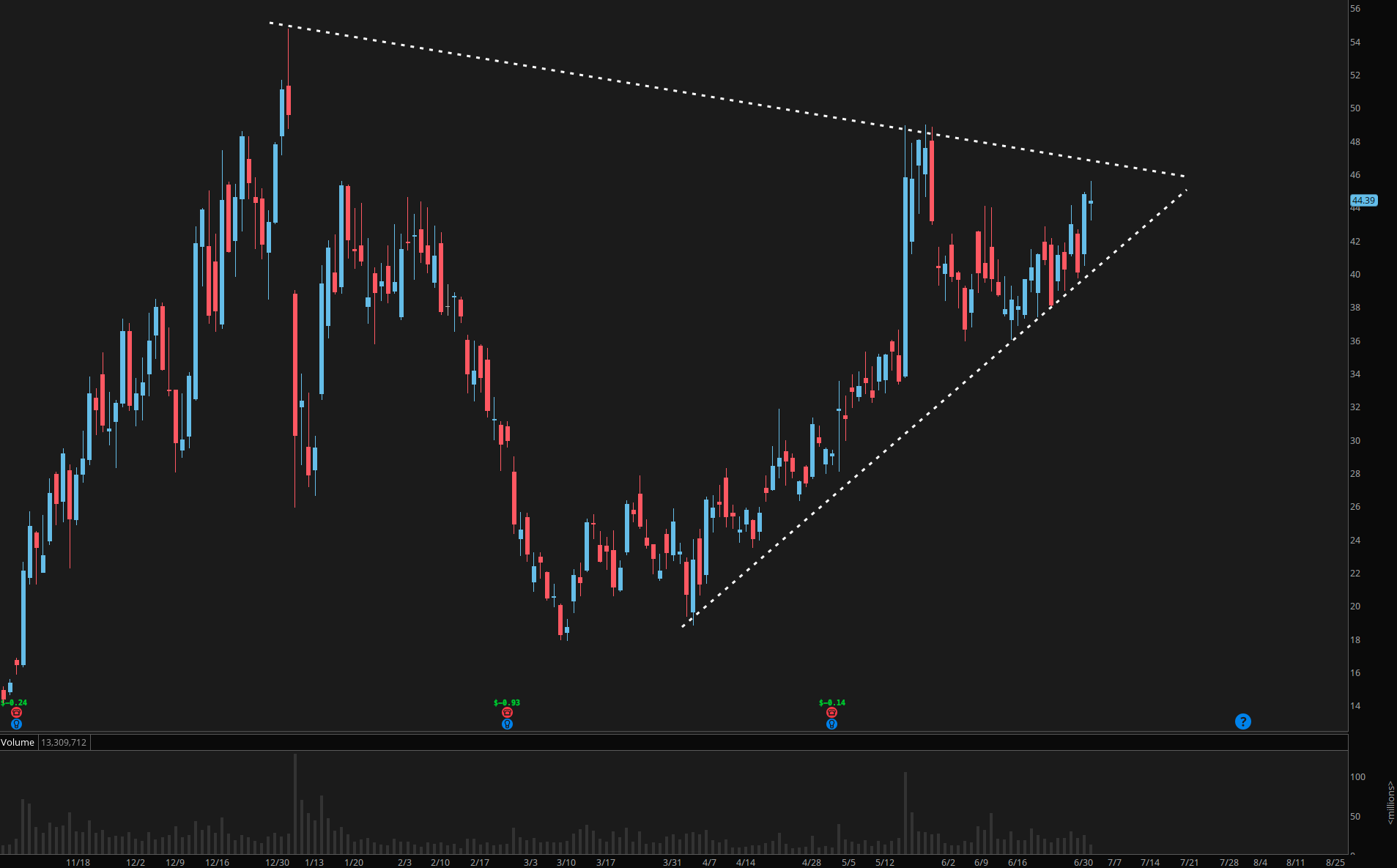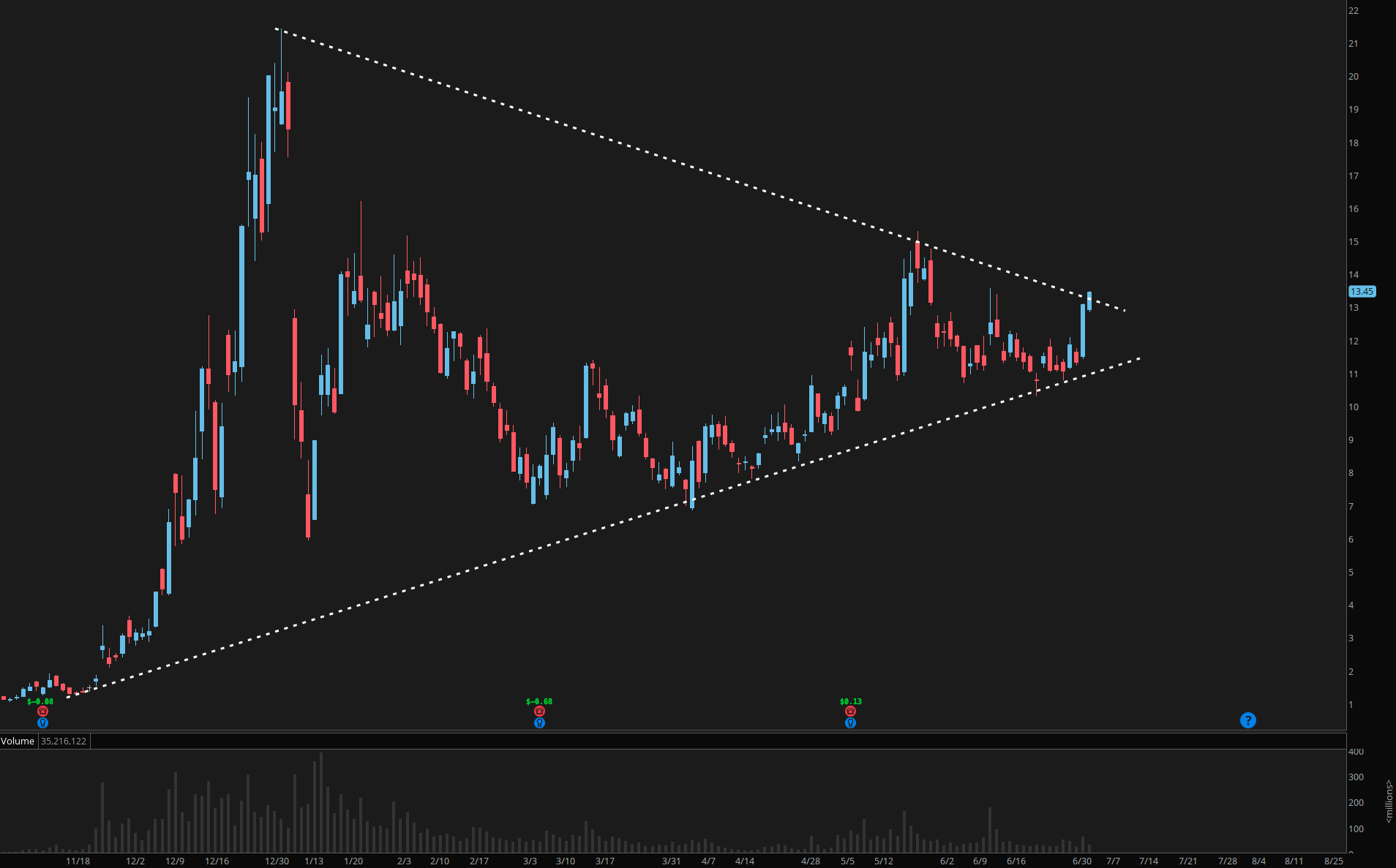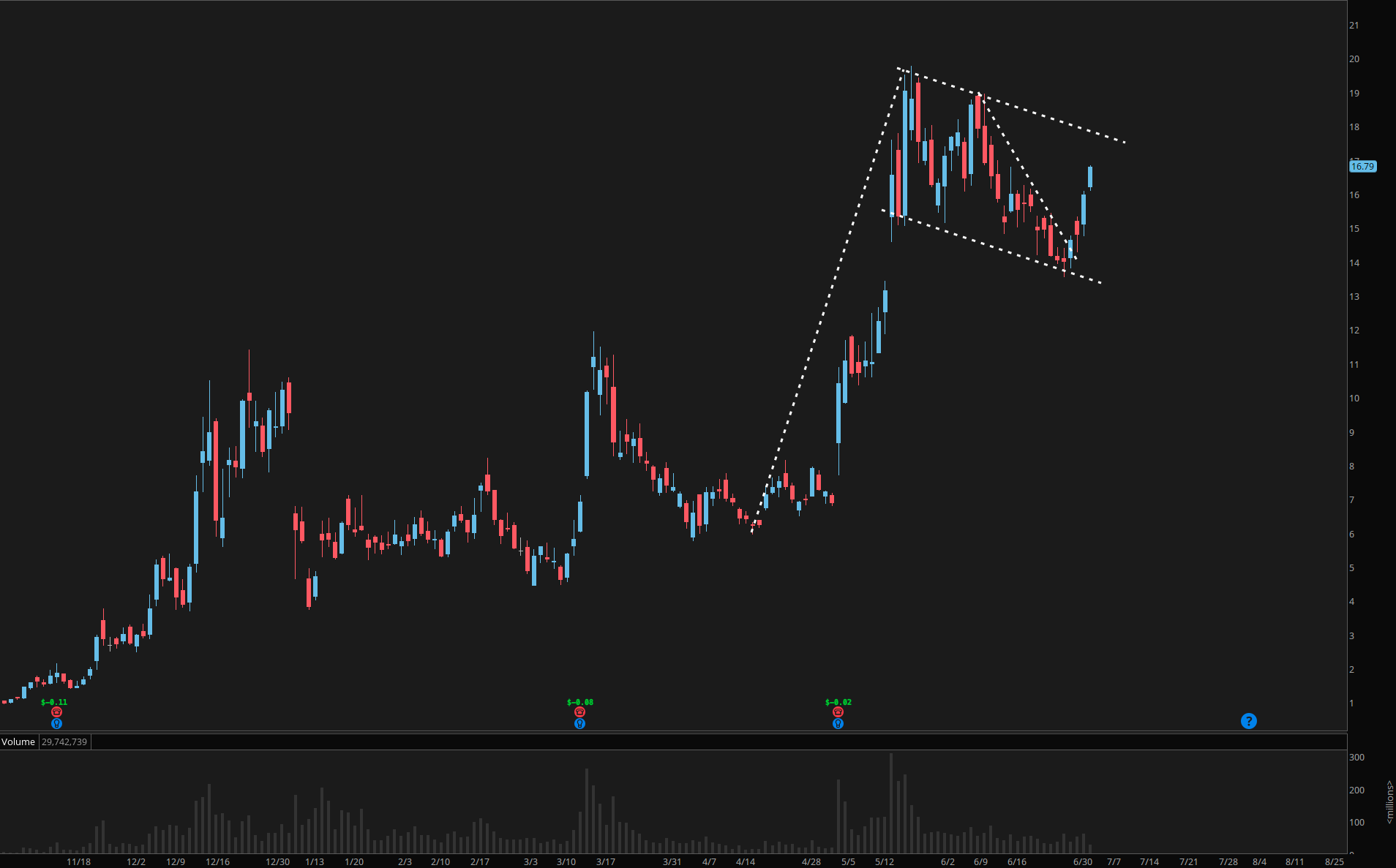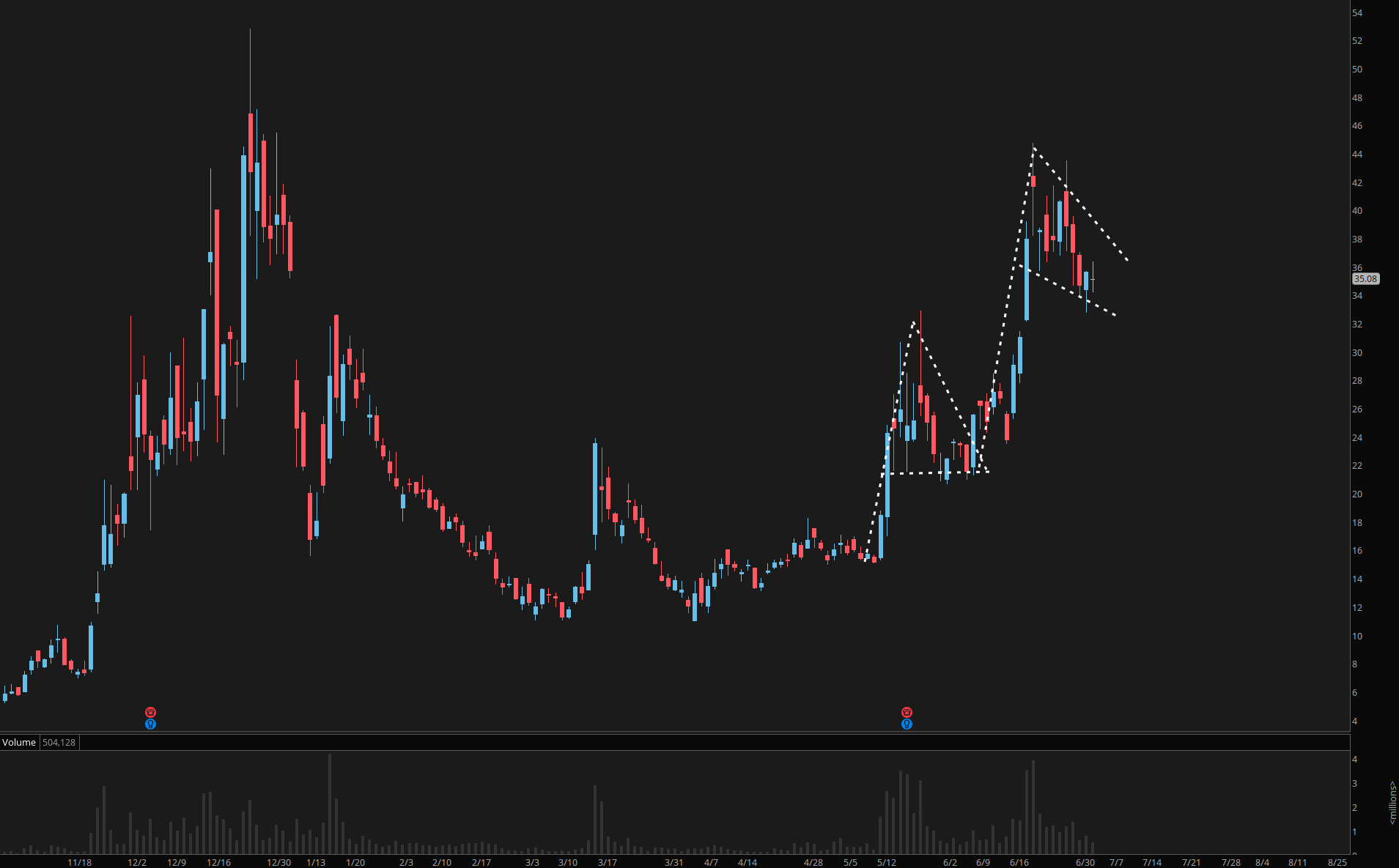Quantum Computing Stocks: Technical Breakouts Signal Next Phase of AI Revolution
Four quantum computing stocks show compelling technical setups as the sector emerges from accumulation. McKinsey estimates $1.3 trillion market by 2035.
Overview
McKinsey's recent projection of $1.3 trillion in quantum computing economic value by the mid-2030s isn't just analyst speculation—it's reflected in the technical action across quantum pure-plays. Four key stocks—IonQ (IONQ), Rigetti Computing (RGTI), D-Wave Quantum (QBTS), and Arqit Quantum (ARQQ)—are showing compelling chart patterns that suggest smart money is positioning ahead of broader market recognition.
The convergence of technical breakouts with fundamental catalysts creates a rare setup. While quantum computing remains early-stage, these companies are transitioning from research concepts to commercial applications, with partnerships spanning everything from cloud computing to financial services. For traders, the technical patterns suggest this sector rotation is just beginning.
The AI revolution transformed markets over the past two years, but quantum computing represents the next evolutionary leap—offering processing power that could make today's most advanced systems look primitive. The charts are telling us institutional investors are starting to price in this reality.
The Quantum Leap Begins
Something remarkable is happening in quantum computing stocks. After months of accumulation and base-building, multiple leaders in the space are printing textbook technical breakouts—just as institutional money starts recognizing the sector’s transformational potential.
Overview
McKinsey’s recent projection of $1.3 trillion in quantum computing economic value by the mid-2030s isn’t just analyst speculation—it’s reflected in the technical action across quantum pure-plays. Four key stocks—IonQ (IONQ), Rigetti Computing (RGTI), D-Wave Quantum (QBTS), and Arqit Quantum (ARQQ)—are showing compelling chart patterns that suggest smart money is positioning ahead of broader market recognition.
The convergence of technical breakouts with fundamental catalysts creates a rare setup. While quantum computing remains early-stage, these companies are transitioning from research concepts to commercial applications, with partnerships spanning everything from cloud computing to financial services. For traders, the technical patterns suggest this sector rotation is just beginning.
The AI revolution transformed markets over the past two years, but quantum computing represents the next evolutionary leap—offering processing power that could make today’s most advanced systems look primitive. The charts are telling us institutional investors are starting to price in this reality.
The Current Quantum Computing Landscape
Quantum computing has reached an inflection point. Unlike classical computers that process information in binary bits, quantum computers use quantum bits (qubits) that can exist in multiple states simultaneously. This “quantum superposition” enables exponentially faster processing for specific applications—particularly in optimization, cryptography, and machine learning.
The sector’s fundamentals are improving rapidly. IBM, Google, and other tech giants have demonstrated “quantum advantage” in specialized tasks, while pure-play companies are securing partnerships with Fortune 500 enterprises. More importantly for traders, the technical charts are confirming institutional accumulation across the leading names.
Why Quantum Matters for AI
The AI boom created massive demand for computational power, straining traditional semiconductor architecture. Quantum computing offers a solution to problems that would take classical computers millennia to solve. McKinsey’s $1.3 trillion estimate isn’t hyperbole—it’s based on quantum’s potential to revolutionize drug discovery, financial modeling, supply chain optimization, and artificial intelligence itself.
For markets, this creates a compelling investment thesis. Just as NVIDIA became the AI infrastructure play, quantum computing companies could become the next-generation computing infrastructure winners. The technical setups suggest this narrative is gaining traction.
Technical Analysis: Four Quantum Leaders
IonQ (IONQ): The Pure-Play Pioneer
IonQ represents the cleanest quantum computing exposure in public markets. The company’s trapped-ion technology has attracted partnerships with Amazon Web Services, Microsoft Azure, and Google Cloud.
 IONQ daily chart reveals classic cup-and-handle formation with strong volume confirmation
IONQ daily chart reveals classic cup-and-handle formation with strong volume confirmation
Rigetti Computing (RGTI): The Comeback Story
Rigetti price rallied from $2 to $21 in the late 2024 and now stabalized around key technical levels. The company’s superconducting quantum processors are gaining traction in government and enterprise applications.
 RGTI daily chart displays potential double-bottom reversal at critical support levels
RGTI daily chart displays potential double-bottom reversal at critical support levels
D-Wave Quantum (QBTS): The Commercial Leader
D-Wave has the longest commercial track record in quantum computing, with over 100 patents and partnerships spanning Volkswagen to Los Alamos National Laboratory.
 QBTS daily chart shows tight consolidation above key moving averages
QBTS daily chart shows tight consolidation above key moving averages
Arqit Quantum (ARQQ): The Cybersecurity Play
Arqit focuses on quantum encryption—potentially massive as quantum computing threatens traditional cybersecurity. The company’s QuantumCloud™ platform addresses post-quantum cryptography concerns.
 ARQQ daily chart reveals extended base-building phase nearing completion
ARQQ daily chart reveals extended base-building phase nearing completion
Sector Momentum Building
The technical setups across quantum computing stocks aren’t coincidental. Several factors are converging to drive institutional interest:
Fundamental Catalysts
- Government Investment: CHIPS Act includes quantum computing provisions
- Enterprise Adoption: Fortune 500 companies testing quantum applications
- Cloud Integration: Amazon, Microsoft, Google expanding quantum cloud services
- Patent Racing: Intellectual property wars heating up
Market Dynamics
- Scarcity Value: Limited pure-play public options
- Early Stage: Most investors haven’t discovered the sector yet
- AI Connection: Quantum computing as AI’s next frontier
- Infrastructure Play: Similar to early-stage AI semiconductor thesis
Trading the Quantum Revolution
The quantum computing sector offers compelling risk/reward, but requires careful position sizing given volatility. Here’s how to approach these setups:
Entry Strategy
- Staged Approach: Build positions on breakouts with volume confirmation
- Portfolio Allocation: Keep individual positions under 2-3% initially
- Diversification: Spread risk across multiple quantum names
- Timing: Wait for technical confirmation rather than anticipating
Risk Management
- Stop Losses: Place below pattern support levels
- Position Sizing: Account for high volatility (50%+ moves common)
- Timeline: Think 12-24 months for major moves
- Fundamentals: Monitor partnership announcements and earnings
What to Watch
- Volume Confirmation: Breakouts need above-average volume
- Sector Leadership: Which stocks lead during rallies
- News Flow: Partnership announcements drive sentiment
- Technical Levels: Respect support/resistance zones
The Bigger Picture: Why Now?
Quantum computing stocks are emerging from obscurity at precisely the right moment. The AI revolution created massive demand for computational power, while traditional semiconductors face physical limitations. Quantum computing offers a solution to problems that scale exponentially.
For traders, this creates a unique opportunity. The sector is early enough that most institutional money hasn’t positioned yet, but advanced enough that commercial applications are emerging. The technical patterns suggest accumulation is accelerating.
Historical Parallels
Consider the early stages of previous technology revolutions:
- Internet (1995-1997): Most investors dismissed as speculation
- Cloud Computing (2008-2010): “Who needs remote servers?”
- AI/Machine Learning (2016-2018): Limited understanding of potential
Quantum computing today feels similar to AI in 2016—real applications emerging, institutional interest building, but mainstream recognition still limited. The technical charts suggest smart money is positioning ahead of broader adoption.
Key Takeaways
- Technical Convergence: Multiple quantum stocks showing breakout patterns simultaneously
- Fundamental Support: McKinsey’s $1.3 trillion projection reflects growing commercial viability
- Scarcity Value: Limited pure-play public options create concentration of interest
- Institutional Accumulation: Volume patterns suggest smart money positioning
- AI Connection: Quantum computing represents next evolutionary leap in processing power
- Early Stage: Sector still under-recognized by mainstream investors
Looking Ahead: Catalysts to Monitor
The quantum computing sector faces several potential catalysts that could accelerate the technical breakouts:
Short-Term (3-6 Months)
- Earnings Reports: Revenue growth from cloud partnerships
- Partnership Announcements: Fortune 500 adoption stories
- Government Contracts: CHIPS Act funding allocation
- Technical Milestones: Quantum advantage demonstrations
Medium-Term (6-18 Months)
- Commercial Scaling: Enterprise applications moving from pilot to production
- IPO Activity: Private quantum companies going public
- Acquisition Interest: Big Tech acquiring quantum capabilities
- Patent Developments: Intellectual property breakthroughs
Long-Term (2-5 Years)
- Market Maturation: Standardization of quantum computing protocols
- Cost Reductions: Quantum hardware becoming more accessible
- Integration: Quantum-classical hybrid computing adoption
- New Applications: Unforeseen use cases emerging
Action Items for Traders
Based on the technical analysis and sector fundamentals:
- Monitor Breakouts: Watch for volume-confirmed moves above resistance
- Position Sizing: Start small given sector volatility
- Diversification: Don’t concentrate in single quantum name
- News Monitoring: Track partnership and milestone announcements
- Technical Discipline: Respect support/resistance levels
- Long-Term Perspective: Think years, not quarters, for major moves
The Bottom Line
Quantum computing stocks are sending clear technical signals: institutional accumulation is accelerating, base patterns are completing, and breakouts are imminent. While the sector remains speculative, the convergence of technical setups with fundamental catalysts creates compelling risk/reward.
The AI revolution taught us that transformational technologies often emerge faster than expected. Quantum computing could be the next chapter in this story. For traders willing to accept the volatility, these technical patterns suggest the quantum leap is just beginning.
The charts don’t lie—smart money is positioning. The question isn’t whether quantum computing will transform industries, but how quickly markets will price in this reality. Based on these technical setups, that recognition may be starting now.